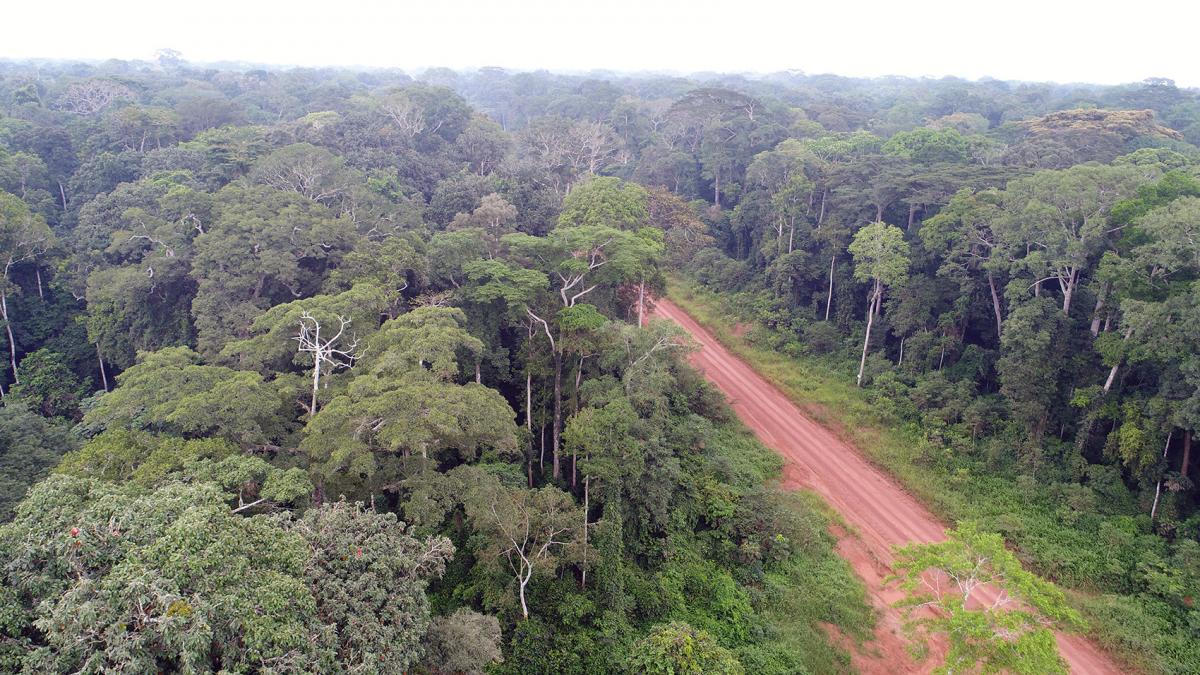- Home
- Worldwide
- CIRAD worldwide
- Projects
- PUDT - Congo Project
Sustainable land use programme - PUDT - Congo

Piste forestière au sein de la forêt tropicale humide du Nord Congo © Laurent Tellier, Cirad
Issues
The goal of PUDT - Congo is to collectively build a process, mobilising methodological tools and data to produce actionable information to enable policy makers to define guidelines for land use planning in Congo.
The project should also create the conditions for the implementation of the spatial planning policy thus defined. This action primarily entails training and capacity building for MATIER (Ministry of Regional Planning, Infrastructure and Road Maintenance) officials and other spatial planning operators.
The challenge for the Sustainable land use programme (PUDT) is thus to succeed in:
- producing data, information and knowledge that is both relevant and up-to-date;
- organising its use, first in policy making processes, then by a group of officials responsible for implementing spatial planning policy.
Description
CIRAD is the leading technical assistance partner in implementing the PUDT through four thematic components:
- Land use planning
Land use planning is the central, cross-cutting element of the project. The activities should lead to the development of a national land use plan (PNAT) and a national spatial planning strategy (SNAT). This will require the creation and implementation of an unprecedented inter-sectoral consultation process in Congo. It will be based on coordination by GACAT (group for facilitation and consultation on land use planning), the group in charge of analysing the results of the project and proposing planning recommendations for the highest political level. This group, comprised of representatives from 13 ministries, the private sector, the decentralised authorities and civil society, will be supported by CIRAD and the World Resources Institute (WRI). This component will be informed by the work of four sectoral components, agriculture, forests, energy and environment, whose focal areas will directly impact land use. - Sustainable forest management
Congo has relatively low deforestation rates. However, the need for economic diversification through agriculture could lead to land use change and impact high conservation value (HCV) or high carbon stock (HCS) forests. The goal of this component is to define a national methodology to identify HCV/HCS forests and to produce potential maps of HCV/HCS areas that will be protected by a status to be defined. The consultation group and government bodies will make a decision on the integration of HCV/HCS forests into the SNAT and the PNAT.
- Definition of the agricultural sector and zero-deforestation projects
In the agricultural sector, CIRAD will conduct studies on the agronomic potential of the different parts of the country in order to establish development scenarios for the crops prioritised by the government of Congo (cassava, groundnut, maize, etc.). Its action will combine fieldwork, surveys, modelling, scenarios and support, and will help to delimit areas dedicated to agriculture.
- Sustainable energy supplies for the cities of Brazzaville and Pointe-Noire
More than half of the population is concentrated in the cities of Brazzaville and Pointe-Noire. These cities are exerting growing pressure on agricultural production areas and fuelwood to meet urban demand. The goal of this component is to produce roadmaps for fuelwood supplies (SDABE) for the cities of Brazzaville and Pointe-Noire. This work will entail data collection to characterise domestic energy consumption in urban households, to organise fuelwood supply chains and to define the limits of the supply basins and their available wood resources. In the second phase, a multi-stakeholder, multi-sectoral consultation process will define technical and economic measures for the sustainable management of fuelwood resources that will be transcribed into the SDABEs.
Expected results
The Sustainable land use programme (PUDT) in the Republic of Congo will define a process for rural land use planning that supports the country’s sustainable development and economic diversification policy while limiting impacts on forests.
The expected results of the land use planning component are:
- the consultation structures will be operational and will enable the implementation of the land use planning policy;
- the PNAT and the draft SNAT 2026 will be produced through a holistic approach combining analyses of spatialised sectoral strategies;
- pilot local land use plans will be developed and aligned with a methodology for the development of departmental spatial planning strategies and plans.
The results of the sustainable forest management component are:
- work to identify HCV and HCS forests will be validated and used;
- methods for the management and monitoring of HCV and HCS zoning will be produced and validated;
- HCV and HCS areas will be identified at the national level for their integration into land use planning.
The results of the agriculture component are:
- areas with high agricultural potential for zero-deforestation will be identified by commodities at the national level;
- the scenarios produced for the strategic development of agricultural production areas will be aligned with the country’s production objectives and national land use guidelines, making it possible to spatialise priority investment areas;
- agricultural value chains with zero deforestation and zero conversion of natural ecosystems will be promoted and publicised.
The results of the sustainable energy supplies for the cities of Brazzaville and Pointe-Noire component are:
- energy consumption and fuelwood supply chains will be characterised;
- alternative sustainable proposals will be studied and formulated;
- SDABEs will be produced and implemented following a multi-stakeholder consultation process.
























